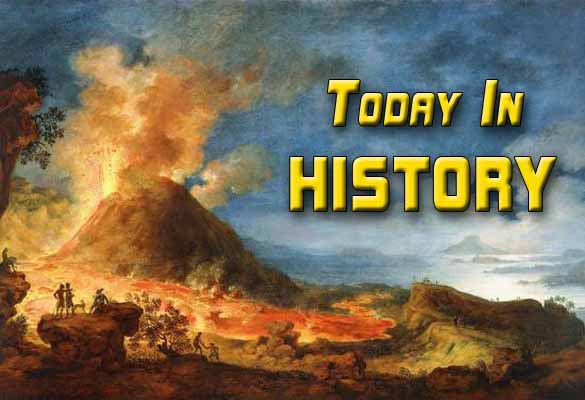- Thursday, 22 January 2026
- Have a HOT TIP? Call 704-276-6587 or E-mail us At LH@LincolnHerald.com
Today In History – August 24
August 24 is the 236th day of the year (237th in leap years) in the Gregorian calendar

(Public Domain Photo)
Today in History in 79 Mount Vesuvius erupted, destroying Pompeii, Herculaneum and Stabiae. The modern city of Naples now stands on the edge of the disaster area.
Our on this day in history archives contain over 200,000 events, birthdays and deaths from 6,000 years of history. Here is a roundup of a few of them:
August 24 is the 236th day of the year (237th in leap years) in the Gregorian calendar. There are 129 days remaining until the end of the year.
EVENTS
79 – Mount Vesuvius erupted, destroying Pompeii, Herculaneum and Stabiae. The modern city of Naples now stands on the edge of the disaster area.
410 - The Visigoths under King Alaric I begin to pillage Rome.
455 - The Vandals, led by King Genseric, begin to plunder Rome.
1200 - King John of England marries Isabella of Angoulême in Bordeaux Cathedral.
1215 – Pope Innocent III declares Magna Carta invalid.
1349 - 6000 Jews are killed in Mainz after being blamed for the Bubonic Plague.
1391 - Massacre on the Jewish population of Palma de Mallorca.
1456 – Printing of the Gutenberg Bible is completed.
1482 - The town and castle of Berwick-upon-Tweed are captured from Scotland by English troops.
1516 - The Ottoman Empire under Selim I defeats the Mamluk Sultanate and captures present-day Syria at the Battle of Maq Dabiq.
1561 - William of Orange marries Anne of Saxony.
1572 – St. Batholomew's Day massacre: Start of a massacre of Huguenots (French Protestants) under the orders of King Charles IX of France.
1608 - The first English representative to India lands in Surat.
1662 - The Act of Uniformity requires England to accept the Book of Common Prayer.
1682 - William Penn adds present-day Delaware to his colony of Pennsylvania.
1812 - Peninsular War: A coalition of Spanish, British and Portuguese forces succeeds in lifting the two-and-a-half-year-long Siege of Cadiz.
1814 – British troops invade Washington, D.C., burning many buildings, including the White House.
1815 – The modern Constitution of the Netherlands is signed.
1821 - The Treaty of Cordoba is signed in present-day Veracruz, Mexico, concluding the Mexican War of Independence from Spain.
1848 - The ship Ocean Monarch bursts into flames near Llandudno, north Wales. 208 people are saved by nearby ships, while 178 are killed.
1857 - The Panic of 1857 economic crisis begins in the United States.
1875 – Captain Matthew Webb becomes the first man to swim across the English Channel.
1891 - Thomas Edison receives a patent for the motion-picture-camera.
1909 – Workers start pouring concrete for the construction of the Panama Canal.
1912 – Alaska becomes a United States territory.
1914 - World War I: German troops occupy Namur, Belgium.
1929 - 67 are killed in a massacre in Hebron, leading to the expulsion of Jews from the city.
1931 - France and the Soviet Union sign a neutrality/no attack treaty.
1932 – Amelia Earhart becomes the first woman to fly non-stop across the United States.
1936 – The Australian Antarctic Territory is created.
1949 - The treaty creating NATO goes into effect.
1954 - President of Brazil Getulio Vargas resigns and commits suicide shortly after.
1954 - US President Dwight D. Eisenhower signs the Communist Control Act, which bans the American Communist Party.
1960 - At -88.3 degrees Celsius, the lowest-ever temperature up until that point, is measured at the Soviet Vostok Research Station in Antarctica. This record stands until 1983, when, also at the Vostok Station, the even colder temperature of -89.2 degrees Celsius is measured.
1963 - The German football league, the Bundesliga, starts.
1968 – France explodes its first hydrogen bomb.
1981 – Mark David Chapman is sentenced to at least 20 years in prison for the murder of John Lennon.
1989 - Tadeusz Mazowiecki becomes Prime Minister of Poland, becoming the first non-Communist leader of Poland in the post-World War II period.
1989 - Colombian drug barons declare "total war" on Colombia's Government.
1989 - Cincinnati Reds manager Pete Rose is banned from baseball for gambling, by commissioner A. Bartlett Giamatti.
1991 – Mikhail Gorbachev resigns as head of the Soviet Union's Communist party.
1991 – Ukraine declares independence from the Soviet Union.
1992 – Hurricane Andrew makes landfall in southern Florida as a Category 5 hurricane. It causes a lot of damage and becomes one of the US's costliest natural disasters.
1994 - Initial accord between Israel and the Palestinian Liberation Organization about partial self-rule in the Palestinians in the West Bank
1995 – MSN is launched.
2001 - Air Transat Flight 236 runs out of fuel over the mid-Atlantic Ocean, making a safe emergency landing on the island of Terceira, Azores.
2004 – 89 people die in explosions on two jets at Moscow's Domodedovo Airport.
2006 – The definition of the word planet is changed, therefore stripping Pluto of its planet status, making it a dwarf planet.
2008 - The 2008 Summer Olympics in Beijing end. The host nation, the People's Republic of China, wins the most gold medals, ahead of the United States.
2011 - Steve Jobs resigns as CEO of Apple Inc.. He dies six weeks later.
2012 - American cyclist Lance Armstrong announces that he is no-longer fighting doping allegations, and is stripped of the seven Tour de France titles he won by the World Anti-Doping Agency.
2012 - Anders Behring Breivik is declared sane by a court in Oslo, and sentenced to 21 years in prison for the 2011 Norway attacks, in which he had killed 77 people.
2016 - A major earthquake hits Central Italy, killing 276 people.
2016 - The discovery of "Proxima Centauri b", a planet orbiting around the star Proxima Centauri, is announced.
2018 - Scott Morrison becomes the 30th Prime Minister of Australia, after defeating Peter Dutton in a contest to replace Malcolm Turnbull.

 Lincoln Herald Staff
Lincoln Herald Staff











